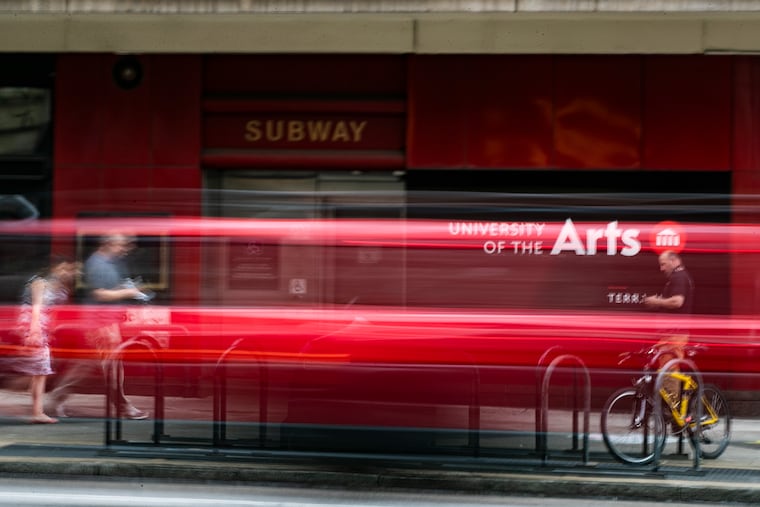UArts staffers seek a union: ‘Nearly untenable working environment’
Full and part-time staff say job insecurity, and lack of wages and benefits are driving the unionization effort. The faculty unionized over a year ago.

Staff members seeking to unionize at the University of the Arts announced Monday that they wanted to affiliate with United Academics of Philadelphia, which already represents UArts faculty members.
The bargaining unit for full and part-time staff members would be separate from the faculty unit, organizers said. Faculty members unionized over a year ago and are now in contract talks with the university.
A majority of the approximately 120 full- and part-time staffers – who are involved in virtually all administrative and academic departments — have signed union authorization and membership cards with the UAP, organizers said.
In a letter to UArts president David Yager and the university board of trustees delivered Monday, they requested voluntary recognition from the university.
In a statement, UArts President David Yager acknowledged receipt of the letter.
“This afternoon, we received a letter from a group of part-time and full-time nonfaculty professional and nonprofessional staff, announcing their intention to form a union represented by the United Academics of Philadelphia,” Yager said in his response. “We value all that our staff contribute to the UArts community and appreciate their work in support of the University, our students and our mission. We will respond after we have had time to thoughtfully consider the request with our leadership and Board of Trustees.”
Organizers said that the UArts union would be the first for staff across an entire academic institution in the Philadelphia area in over 40 years, but that there are unionized staff employees at other colleges and universities, including Temple, Rutgers, and Community College of Philadelphia.
UAP is a local of American Federation of Teachers that already represents adjunct faculty at Arcadia University, as well as adjunct and non-tenure track faculty at University of the Arts. The UArts staff unit would be UAP’s first bargaining unit of university staff members.
“The UArts staff work tirelessly to support students and faculty, and they deserve a voice in determining their working conditions,” Daniel Pieczkolon, UAP president, said in a statement. “We’ve asked the university to voluntarily recognize the staff’s decision to unionize by 12pm on March 15th, but if they do not, then we’ll look forward to a free and fair election process without any interference from the university’s administration.”
If the university refuses to voluntarily recognize the union, as it did with UArts faculty, then the National Labor Relations Board will supervise a formal union vote, organizers said. (In November of 2020, faculty members voted 252-2 in favor of UAP affiliation.)
University employees said lack of cost-of-living wage increases, lack of job security, and lack of benefits for part-time staff are significant drivers of the union effort.
Hannah Burke, full-time senior administrative assistant in the film school, said that the university is experiencing “record turnover” because of low pay, among other issues.
“Retaining our staff is crucial to the success of the entire university,” she said.
Yasmine El Gheur, a full-time senior administrative assistant for nearly four years, said she has not received a raise or cost-of living wage increase for that entire period. “Technically I’m making less than when I started with inflation continuing to increase,” she said, adding that the university lacks “a clear path for raises and promotions for most staff.”
Dan Espie, a part-time accompanist in the theater department for five years, said that he had no benefits such as health insurance.
“One of the primary issues” for accompanists, Espie said, is that “they are not on a contract.”
“So there is a major issue with job insecurity in the sense that we don’t have a guarantee that, from semester to semester, we will be brought back,” he said.
In an earlier statement, Espie said that UArts accompanists function within a “nearly untenable working environment that results in employee turnover at an appallingly high rate.”
The Philadelphia Inquirer is one of more than 20 news organizations producing Broke in Philly, a collaborative reporting project on solutions to poverty and the city’s push toward economic justice. See all of our reporting at brokeinphilly.org.